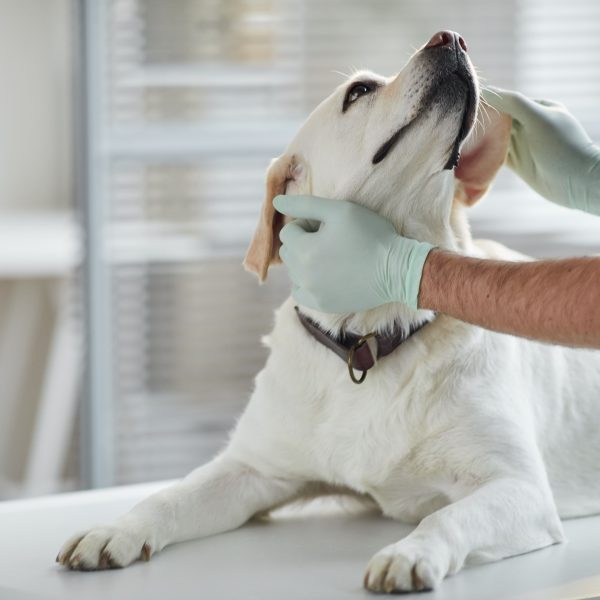Why is My Dog Shaking?

Trembling or shaking is a pretty common occurrence in dogs. Small dogs especially tend to shake more and this is just part of their life. But other times, shaking can indicate anxiety or health issues. If you have to ask “Why is my dog shaking?”, here are a few possible reasons:
5 Reasons Your Dog is Shaking (And How to Help Them)
There may be a few different reasons why your dog might be shaking.
1. Your Dog Might Just Be Excited
Dogs often shake out of excitement and anticipation. Ever hold out a treat to your dog? They often wiggle their body out of pure excitement for the treat.
Some dogs shake or shiver instead of wiggling. Some dogs even pee when excited. No one knows why some dogs shake instead.
It’s important to read your dog’s body language. If they seem happy and there’s a reason for excitement, the shaking is nothing to worry about. Once they calm down, they should stop shaking.
2. They’re Cold
Dogs, especially dogs with very thin coats like Doberman Pinschers or small dogs, tend to shiver when they’re cold. Shivering is a natural and involuntary movement that helps get the blood moving and warms up the body. Smaller dogs are more susceptible to shivering due to a smaller body mass and less insulation.
If your dog shivers a lot in the cold, it might be a good investment to find a good dog sweater or coat. There are a few useful winter dog products to try to keep your dog warm. Giving your dog an extra layer of warmth can ease those shivers and keep them comfortable.
You should also limit their time outdoors. And if it gets cold at night in your home, make sure they have a cozy dog bed or blanket near (but not up against) a heating vent. These changes should keep your dog feeling warm and cozy.
3. Your Dog is Experiencing Stress, Fear, or Anxiety
If your dog is scared, has separation anxiety, or is stressed out by something, they may start shaking. This might happen during fireworks, thunderstorms, or unexpected visitors. This is a natural response and once the stressor is gone or they relax, they should stop shaking.
If your dog is shaking due to these factors, try your best to work with your dog’s anxiety and help them calm down. Sit with them, and gently pet them, play with them, or offer a treat. Distracting them like this can help them calm down.
If they routinely get spooked by thunderstorms, there are ways to calm your dog during a storm. Set up a safe area for them, like a closet or the basement. You can try to play a sound machine as well to drown out the loud booms.
4. They Could Have Generalized Tremor Syndrome
Some dogs just shake or tremble. This is particularly common in small dogs like Chihuahuas. These small dogs may shake more due to anxiety, being cold, or other unknown reasons. You should only be concerned if this is a new behavior or if it accompanies other behavior changes.
Check with your vet if this shaking hinders your dog’s family activities. They may be able to diagnose your dog with Generalized Tremor Syndrome, which can be treated with corticosteroids.
5. Your Dog Might Have Other Medical Reasons
There are a few different medical reasons that may cause your dog to shake.
Pain and Muscle Weakness or Injury
Shaking can be one of the signs your dog is in pain. When they’re hurt, shaking can be a way to show their discomfort. This shaking may also be accompanied by lethargy. If your dog is experiencing these symptoms, call your vet for an appointment.
Shaking can also be a sign your dog is getting too much exercise or exercise too hard. If you’ve ever pushed yourself too hard at the gym or during a long run, you know the feeling. If the shaking persists or your dog seems to be in pain, call your vet. They may need to check for strains or pulls in the muscles.
Diseases
There are a few diseases and conditions that can cause shaking in dogs. Things like distemper, canine epilepsy, or other neurological diseases can be the cause of shaking. If your dog suddenly begins shaking, keep track of their appetite, activity levels, and behavior.
Doing this helps to determine if you should seek medical care. Some medical reasons for shaking are easy to treat or manage, while others like distemper are very serious and can be fatal. Remember that vaccinations and proper medical care can help avoid certain diseases, which will save you some headaches.
Toxic Ingestion
If your dog eats something toxic, like toxic food for dogs or other toxic substances, those toxic substances may cause shaking. Toxins like mycotoxin (found in moldy food) can cause shaking in dogs.
Also look out for insecticides, chocolate, and caffeine. Call your vet immediately to get medical attention. If you’re unsure your dog ate something that might be toxic, it’s helpful to keep the Pet Poison Helpline in mind if you need an answer ASAP.
If you’re asking “Why is my dog shaking?”, these might be a few reasons. Some dogs shake for no reason, others may just be cold. As always, check with your veterinarian if you have any questions or concerns so your pup can get the proper treatment if needed.
